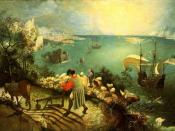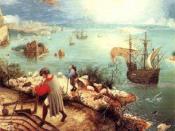Icarus is a character in Greek myth. According to the myth he and his father fly with wings that his father made out of wax and feathers. They are trying to escape from a mean king. Icarus' father warns him not to fly to close to the sun or the wax would melt, ruining his wings. Icarus is caught up in the glory of his flight and does not heed his fathers warning. His wings fall apart and he plummets to the sea and drowns. The myth of Icarus appears to be fairly straight forward, and yet three poets write poems expressing three different perspectives using specific techniques. The three poets and their poems are Edward Field's "Icarus," William Carlos Williams' "Landscape with the Fall of Icarus," and Muriel Rukeyser's "Waiting for Icarus."
In Field's poem, he chooses to change the ending and "decry the impact of modern society upon individuals" (Roberts 928).
In his poem, Icarus does not drown, he "had swum away coming at last to the city where he rented a house and tended the garden" (Field 8 and 9). This is a very common existence for a man who had once soared so high. This poem is about the expectations people have and the reality they get. Icarus is a "hero who goes on living long after the moment of glory, and is puzzled, bored, and unhappy with the drabness of the uneventful life" that he now leads (Roberts 354). No one has any idea who Icarus is, or of the great act he once performed. The witnesses did not care, Field writes, they "ran off to a gang war" (5). His neighbors are all too busy with their own lives to care about who Icarus really is. Edwards is implying that life...



Icarus' Wings of Wax
Very interesting, to see the different perspectives portrayed upon the greek hero, Icarus. Just a thought that, would make your writing more interesting if you made a little reference to Musee De Beaux, in the conclusion :) Overall, a good solid essay.
0 out of 0 people found this comment useful.